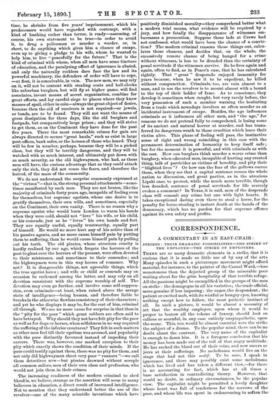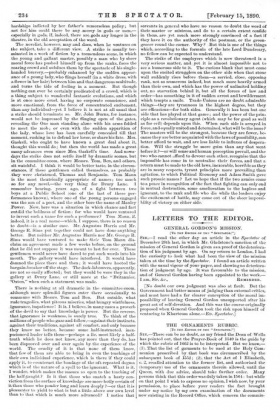CORRESPONDENCE.
A COMMENTARY IN AN EASY-CHAIR:
STRIKES: THEIR DRAMATIC POSSIBILITIES-THE STRIKE OF THE EMPLOYED-THE STRIKE OF EMPLOYERS.
THERE are so many dramatic elements in a strike, that it is curious that it is made so little use of by any of the arts Many episodes in such a picturesque movement might afford material, for instance, to the painter of the Casual Ward,—less monotonous than the dejected group of the miserable poor waiting about for the grim hospitality of that terrible refuge. All the passions might be exemplified in the groups of the men on strike : the demagogue in all his varieties ; the trade official, more genuine if less imposing ; the eager, the despondent ; the patient or excited mob, with its wistful or hungry eyes, knowing nothing except how to follow, the most pathetic instinct of all. In such a picture, it would be almost a necessity of art that the wealthy employer, upon whom it would be proper to bestow all the tokens of luxury, should look on callous or scornful, in any case entirely unsympathetic, upon the scene. This, too, would be almost essential were the strike the subject of a drama. To the popular mind, there can be no doubt about the contrast. The very name of the capitalist is enough to damn him. It is a foregone conclusion that his money has been made out of the toil of that angry multitude. He has sucked the blood out of their veins, and now sneers or jeers at their sufferings. No melodrama would live on the stage that had not this motif. To be sure, I speak in ignorance, and there may possibly exist some melodrama which has lived and has taken a different view,—for there is no accounting for fact, which has at all times a base satisfaction in contradicting theory. However, that would no doubt, in ordinary circumstances, be the popular view. The capitalist might be permitted a lovely daughter whose heart was full of tenderness for the sorrows of the poor, and whose life was spent in endeavouring to soften the
hardships inflicted by her . father's remorseless policy; but not for. him could there be .a.ny _mercy in gods , or men,— especially in gods, if, indeed, there are.goda any longer in the .theatre, -in the old acceptation_of the word.
The novelist, however, may and.does, when he ventures on the sabjectr take a different: view. .A strike is usually ter- minated in a work of fiction by a tremendous scene,. hi which the young and, gallant master, possibly a man who by sheer moral force has pushed himself up from the ranks, faces the roaringorowd and. subdues them by the spectacle of his single- handed bravery,—probably enhanced by the sudden appear- ance of a young lady, who flings herself (in a white dress, with a flowerin her hair) between himand that dangerous multitude, and turns the tide of feeling in a moment. But though nothing: can ever be certainly predicated ofa crowd, which is a. thing :subject to wonderful fantastic evolutions, and which is at once: more cruel, having no corporate conscience, and more emotional, from the force of concentrated excitement, than, any individual—yet I believe it is not at all usual that a strike should terminate so. Mr. John Bums, for instance, would not be impressed by the flinging open of the gates, revealing the One man standing alone with his arms folded to meet the mob ; or even with the sudden apparition, of the lady, whose love has been carefully concealed till that moment, rushing in to defend her lover, or share his fate. Mrs. Gaskell, who ought to have known a great deal about it, thought this would do ; but, then the world has made a great many -advances even since Mrs. Gaskell's time. And nowa- days the strike does not settle itself by dramatic scenes, but in. the committee-room, where Messrs. Tom, Ben, and, others, sit.watchful. I think it would. be better taste, in-the circum- stances, if these gentlemen called themselves, -as probably they were christened, Thomas and Benjamin. Tom Mann is the most theatrically appropriate of names ; too much . so for any novel,—the very thing for Drury lane. I remember hearing, years ago, of a fight between two boys at a Public School (one of the last of :these - per- formances, known), where one of the young persons engaged was the son of a poet, and the other bore the name of Manley Power. Now, here was a situation in which chance and fact outdid the boldness of fiction : for who would have ventured to invent such a name for such a performer? Tom Mann, if, indeed, it is a real name—which, I suppose, there is no reason to doubt—is a similar case. Mr. Augustus Harris and Mr. George R. Sims put together could not have done anything better. .But neither Mr. Augustus Harris nor Mr. George R. Sims would have ventured to make their Tom Mann dis- claim an agreement made a few weeks before, on the ground that he did not. suppose it was meant to last for ever. These gentlemen would never have dared to put such words into--his mouth. 'The gallery would have interfered. It would have damned the piece there and then ; it would have hooted the bargain-breaker off the stage. The dock-labourers, apparently, are not so easily affected ; but they would be were they in the gallery at Drury Lane, or still more at the "-Britannier, 'Osten," when such a statement was made.
There is nothing at all dramatic in the committee-room, „although more splendid figures enter there occasionally to commune with Messrs. Tom and Ben. But outside, what rude tragedies, what piteous miseries, what hungry wistfulness, ignorance, impatience ! It is, I believe, in many cases a proverb . of the devil to say that knowledge is power. But the reverse, that ignorance is weakness, is surely true. To think of the ; millions of people who gaze and follow,—against their instincts, • against their traditions, against all comfort, and only because they know no better, because some .hslf-instructed, inex- perienced. leader tells them—perhaps a lie, most likely a half- truth which he does not know, any more than they do, has been disproved over and over again by the. experience of the -world. The cruelty of it is that none of them know, that few of them are able to bring in even the teachings of their own individual experience, which _is there if they could ,apply it, to counteract. the bondage of the oft-repeated dogma which is of the nature of a spell to the ignorant. What is it, I wonder, which makes the- masses so open to the teaching of the half-taught? Is it that those who -snatch a hasty con- viction from the surface of knowledge are more hotly certain of it than those who ponder long and learn deeply ?—or that it is pleasanter to yield to what is but a little, above our own level than to that which is much more advanced? I notice that servants in, general who have no reason -to doubt the word of their- master or mistress, and do to a certain extent confide in them, are yet much more strongly .convinced of a fact if -they have-it on the authority of the postman, or the green- grocer round the corner. Why ? -But this is one of the things which, according to the formula of the late Lord Dundreary, no fellowycan be expected to understand.
The strike of the employers which is now threatened is a very serious matter, and yet it is almost impossible not to see a humorous side to it. The curious blank that must come upon.the excited strugglers on the other side when that stone wall suddenly rises before them—a serried, close, opposing rank, not so numerous indeed,- but much more heavily armed than their own, and- whichhas the power of unlimited holding out, no starvation behind it, but all the forces of law and order—has something in it of sadden arrest and bewilderment which tempts a smile. Trade-Unions are no doubt admirable things—they are tyrannous in the highest degree, but they are efficacious—for both sides. Generally it has been but one side that has played at that game ; and the power of the prin- ciple as a revolutionary agent (which may be for good as well as for evil) depends upon this. When each side is arrayed-in force, anclequally united and determined, what will be the issue ? The masters will be the strongest, because they are fewer,- be- cause they are better acquainted with the laws of possibility, can better afford to wait, and are less liable to influxes of despera- .tion. Will the struggle be more grim than any that went before it ?—or will sense and human perception prevail, and the two who cannot afford to devour each other, r-ecognise that the impossible has come in to neutralise their . forces, and that a return must be made to the old laws, inexorable, horrible as they are in many respects, tyrant principles more prevailing than. agitation, to which Political Economy and Adam Smith gave such prosaic names P Let us hope that if the two armies come to a peace in recognition of the fact that fighting can only end. in mutual destruction, some amelioration to the hapless and. ignorant, to the rank and file who die while the leaders enjoy the excitement of battle, may come out of the sheer impossi- bility of victory on either side.



































 Previous page
Previous page